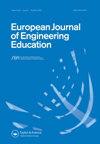将自愿实验室模拟作为准备任务,以提高概念知识和参与度
IF 2.8
Q2 EDUCATION & EDUCATIONAL RESEARCH
引用次数: 0
摘要
实验室任务通常侧重于机械程序,留给学生建立概念性知识的时间和机会有限。我们调查在准备工作中引入模拟任务能在多大程度上帮助学生建立他们的概念知识。我们调查了选修电子模块的两组学生。还分析了两个队列的实验室报告分数(在实验室准备中引入模拟之前和之后)。在队列之间没有发现显著差异,但在引入模拟后,最高分数增加了。学生认为使用模拟有助于他们的建设性知识和知识信心。对自由文本反应的分析表明,学生通过可视化理论和概念,确认和检查结果,以及在物理实验课程前后探索不同的场景,从模拟任务中受益。这些结果表明,在可能的情况下,应该用仿真软件来支持实验室实践。本文章由计算机程序翻译,如有差异,请以英文原文为准。
Using voluntary laboratory simulations as preparatory tasks to improve conceptual knowledge and engagement
ABSTRACT Laboratory tasks often focus on mechanical procedures leaving limited time and opportunities for students to build conceptual knowledge. We investigate to what extent introducing simulation tasks to preparation work can enable students to build their conceptual knowledge. We surveyed two cohorts of students taking an electronics module. Laboratory report marks were also analysed across the two cohorts (before and after introducing simulations in the laboratory preparation). No significant difference was found between the cohorts but the maximum marks increased after simulations were introduced. Students perceived that using simulations aided their constructive knowledge and knowledge confidence. Analysis of the free-text responses suggests that students benefitted from the simulation tasks by visualising the theory and concepts, confirming and checking results, and exploring different scenarios before and after the physical laboratory session. These results suggest that laboratory practicals should be supported with simulation software where possible.
求助全文
通过发布文献求助,成功后即可免费获取论文全文。
去求助
来源期刊

European Journal of Engineering Education
EDUCATION & EDUCATIONAL RESEARCH-
CiteScore
7.30
自引率
13.00%
发文量
64
期刊介绍:
European Journal of Engineering Education is published six times a year in print and electronic editions and provides an essential forum for dialogue between researchers and specialists in the field of engineering education, at European and worldwide levels. European Journal of Engineering Education is the Official Journal of SEFI, the Socièté Européenne pour la Formation des Ingénieurs (the European Society for Engineering Education). SEFI is a non-governmental organization whose aims are to develop information about engineering education, to improve communication and exchange between professors, researchers and students and to promote cooperation between the various institutions concerned with engineering education.
 求助内容:
求助内容: 应助结果提醒方式:
应助结果提醒方式:


